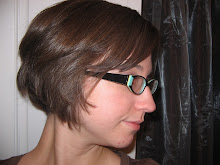At night, my balloon lamp glowing in the corner, my collection of Trolls and E.T. memorobilia casting shadows on the wallls, my parents would take turns reading to me, my little brain imagining the illustrations, the scenes, the faces. I decided that for each year of my life I should get one book. So, the night of my fifth birthday, I selected five books for my mom to read me. They were short picture books, but still a hefty load for a mother who'd worked all day and then worked all night at her second job as a wife to my dying father and as a mother to my adventurous young self.
While my mom did most of the reading in the house, my dad did most of the writing. He had been somewhat of a freelance journalist in his hometown on Bayonne, New Jersey. After we moved to Indiana, he would send the newspaper back home regular updates on his new life outside of the city. I imagine him lamenting the homogenous cul de sac we called home, dreaming of the immigrant neighbors he once knew who would bring him bread and stews in his bachelor days and came to bless me with their spells and potions when I was born. He wrote to them about his luck in finding an Irish community in his new city, but how they were all men merely decending from "the green place" and some had never even been there. With pride he recounted being chosen to ride on the Ancient Order of Hibernians float in the Indianapolis St. Patrick's Day parade. I wonder how many people read my father's words so far away in his old life, his old city. I wonder how many of them still remember a passage or a word or a quote or even his name.
My few memories of him lead me to our solid oak dining table where he always sat to write. He would set out his mug that read "DAN" in huge brown letters down the side, fill it with tea, and then begin to write. I remember hearing the typewriter that always sounds so loud and obnoxious in movies, but at home it came out like waves on the bottom of a boat, or a breeze, or rain.
Whether it was an actual joy I found in words while being read to, a way to mimic my father, or the realization that I would never be able to mimic my mother's musical abilities, I took to stapling together construction paper, making my own paperback books. I would examine books my father had by his bed or by the sofa or in the car or in the kitchen---he read everywhere. I would examine the way the books looked and remake them. On the back of my homemade books I would draw a picture of myself and write a short biography. I would make a cover, a title page, and leave a blank page before the story started like I often observed in "real" books. I would hold books, smell there musty pages, their clean and new pages, listened to the way their spined snapped, the way the library's protective plastic jacket crackled, the definitive way the pages and covers came together with a slam. I got to know their bodies in an intimate way, opening them and closing them and holding them just to see how it felt.
Too young to tackle all of the pages in Louisa May Alcott's Little Women, my mom took me to see it in the theatres when Susan Sarandon and Winona Rider made it a popular story again. I felt a sudden kinship with Jo when Professor Bear pointed to her ink-stained hand. Her travel to big cities and lofty universities became my visions of my future, and the image that I tried to articulate when adults would ask, "What do you want to be when you grow up?" Traveling to New Jersey and New York the year after my father died to visit his family, I thought about the movie and if I'd ever live in New York, and if my dad would be proud that while he left his urban home, I would come back to it.
One of my favorite writers these days is Thomas Lynch. He is an undertaker by trade, and it greatly influences his writing. His ideas about death and life are attractive to that part of me who encountered the death of my father at a young age. It helps explain it to me, explain my mother's actions at the time, explain the way I felt. Most importantly though, Lynch's lapsed yet loyal Catholicism and his Irish heritage bring me to my living father. The concrete memories of him are few, but the essence of the Irishman, writing in a darkened dining room in the suburbs of Indianapolis in my youth haunt me, taunt me, make up a crucial part of my identity. Perhaps his identity as a writer is why my identity is so tied to words. It is me, but it is also him. I am not the first Sweeney to claim space on pages of newpapers and journals, to struggle for hours in a dark house in the wee hours of the morning, the love of my life supporting me, but also finding it strange. I am the second, even if I'm the last, I am the second, so that my father was not the last. So that he is not entirely gone. So that he is still with me in a real way that I can touch, see, and believe. Not relegated to a ghostly or angelic make believe, hovering above me with a god I have never been able to acknowledge as present or plausible, but hovering in my mind, in my hands, in my words. He is there. So am I.
Subscribe to:
Post Comments (Atom)

No comments:
Post a Comment